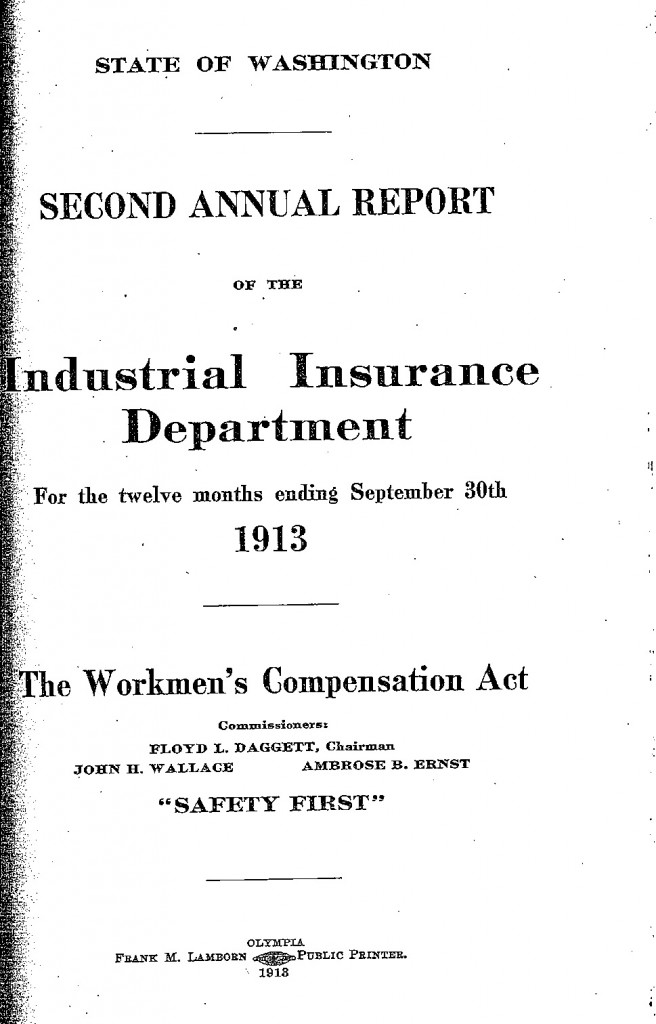A.B. Ernst
 From the desk of Steve Willis, Central Library Services Program Manager of the Washington State Library:
From the desk of Steve Willis, Central Library Services Program Manager of the Washington State Library:
Time has rewarded the Dutchman who ran the potato-bug newspaper, while The Argus is now mostly a political footnote in Washington State political history.
The election of 1896 was preceded by one of the most emotionally charged campaigns in the history of the United States. William Jennings Bryan, the Democratic and Populist parties nominee, had excited a large portion of the agrarian and Western population through his charisma and rhetoric. Meanwhile the Republicans stood by an Establishment status-quo man, William McKinley.
The Argus was a weekly Republican organ out of Seattle. The following piece is from their issue of August 8, 1896:
WHO IS A JUDAS?
“The Review, a contemptible little one horse rag with a sworn circulation of 400 copies, which moved from Fremont to Seattle when the Telegraph died with the aim of becoming the democratic ‘orgin,’ worked itself into a frenzy last week because Receiver BAKER, of the Merchants’ National Bank, had refused to support BRYAN and the populistic platform.”
“The Dutchman who presides over the editorial columns of the little potato-bug must have partaken of too much limberger, intermixed with sauerkraut and dunderfunk and the whole heterogenous mass must have resulted in a bad case of infantile colic, thus causing him to work off his anarchistic sentiments all at once, with the hope of wiping Receiver BAKER off the face of the earth with one fell swoop.”
“It is refreshing to hear this fellow whose only aim seems to be to work all of the legal notices possible out of the land office, Call Receiver BAKER, who is to him what a diamond is to a dung-hill, ‘Benedict Arnold or Judas Iscariot,’ simply because that gentleman has too much self respect to stand in with his little play to get the land offices for another four years.”
“A democrat is a funny thing, but this democrat is especially funny.”
Several follow-ups here worth noting:
Bryan did lose the Presidential election, but the Populists won every, and I mean every, statewide elective office in 1896. The closest parallel I can think of in living memory was the widespread election of post-Watergate “outsiders” in 1974 and 1976, including President Jimmy Carter and Governor Dixy Lee Ray. In both historical cases, the bubble was short-lived.
Receiver Baker was Charles H. Baker, who was later the force behind the electrical generating plant at Snoqualmie Falls.
The Seattle Telegraph had a run from 1890 to Feb. 1896.
The Argus changed title to Argus Magazine in the early 1980s but then it died shortly after, ironically in the era of Ronald Reagan.
The Review, mentioned here in such a condescending way, was also known through time as the Fremont Saturday Review and the Seattle Review and the Fremont Herald. Apparently the Fremont Saturday Review had the subtitle: “Fremont First — the World Afterward — Heaven Next.” It is my sad duty as a librarian to inform you that no manifestations of this newspaper exist in any library, according to OCLC. Unless someone out there steps forward, this is yet another newspaper lost to history.
In 1896 the term “Dutchman” was an ethnic slur against German-Americans, a shortening of Deutschmann. The additional references to limberger, sauerkraut and the obscene dunderfunk, not to mention anarchy, reflected a bit of xenophobia on the part of the The Argus. The prejudice against German-Americans was fairly short-lived, since many in that cultural group generally made it a top priority to quickly assimilate and mainstream. Much of this is outlined in Dale R. Wirsing’s Builders, Brewers and Burghers : Germans of Washington State (1977).
The German-American in this particular case was Ambrose Basileus Ernst (1861-1931). He came to America as a child  with his family in 1872 and was raised in Wisconsin. In 1890 he migrated to Woolley, Washington and became the publisher of the Skagit County Times.
with his family in 1872 and was raised in Wisconsin. In 1890 he migrated to Woolley, Washington and became the publisher of the Skagit County Times.
By 1892 Ambrose was active in the Seattle Democratic Party and running a newspaper out of Fremont. He later became involved with mining interests.
In 1906 Ernst was appointed to the Seattle Park Commission where he earned fame as “The Father of City Playfields.”
Gov. Lister appointed Ernst to the State Industrial Insurance Commission in 1913. A photo of Ernst can be found in the 2nd Annual Report of the Industrial Insurance Department.
Unfortunately for Ernst, a major swindle of the Commission took place under his watch in 1915, and although blameless, he became one of the political victims. He did serve the public in one more position as a member of the Civic Auditorium Commission in 1919. He died in Seattle in 1931.
Ambrose B. Ernst has had the last laugh on the snarky Argus editorialist of 1896. Over a decade ago a Seattle city park was dedicated next to the Fremont Library and it was named A.B. Ernst Park in honor of Ambrose’s significant contributions when he was on the Park Commission. His former home (no longer standing) was almost across the street from the park. Not a bad tribute for the editor of a potato-bug newspaper.
You can follow any responses to this entry through the RSS 2.0 feed. Both comments and pings are currently closed.







